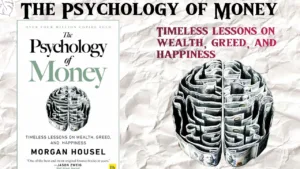Money is not just about buying fancy things; it’s about having control over your time and life, which is like having real freedom.
In Morgan Housel’s “The Psychology of Money,” you’ll learn how to make smarter money choices and have a better relationship with it. The book talks about how we behave with money. According to the author, here’s what you need to do:
- Know What You Want with Money:
- Figure out what you really want to do with your money.
- Make Your Own Plan:
- Make a game plan that fits what you want and stick to it. Don’t try to show off to impress others; it’s not worth it.
We recommend this book and believe you’ll find it valuable. I may earn a commission if you purchase through my link, at no additional cost to you. WeGetSavvy participates in the Amazon Services LLC Associates Program, an affiliate advertising program designed to help websites earn advertising fees by linking to Amazon.com
.

What to expect from the book:
Chapter 1: “No One’s Crazy”:
- Explores the diversity in financial behavior, emphasizing that seemingly irrational choices often make sense within individuals’ unique contexts.
Chapter 2: “Luck & Risk”:
- Delves into the role of luck and risk in financial success, illustrating how they intertwine and influence outcomes.
Chapter 3: “Never Enough”:
- Examines the concept of “enough” in wealth, highlighting how personal definitions of sufficiency impact financial decisions.
Chapter 4: “Confounding Compounding”:
- Unpacks the powerful impact of compounding over time, emphasizing the significance of patience in financial endeavors.
Chapter 5: “Getting Wealthy vs. Staying Wealthy”:
- Differentiates between the skills needed to amass wealth and those crucial for maintaining it, offering insights into sustainable financial success.
Chapter 6: “Tails, You Win”:
- Explores the influence of extreme events (tail events) on financial outcomes and the importance of preparing for the unexpected.
Chapter 7: “Freedom”:
- Discusses the relationship between money, freedom, and the true essence of financial independence.
Chapter 8: “Man in the Car Paradox”:
- Examines the paradox of visible wealth and the often-overlooked financial challenges that high-status individuals may face.
Chapter 9: “Wealth is What You Don’t See”:
- Highlights the hidden aspects of wealth, focusing on the impact of unseen efforts and decisions on financial well-being.
Chapter 10: “When You’ll Believe Anything”:
- Explores the influence of narratives and storytelling on financial decisions, revealing how beliefs shape our perceptions of money.
Chapter 11: “The Seduction of Pessimism”:
- Explores the allure of pessimism in financial decision-making and its impact on long-term wealth.
Chapter 12: “When Tailwinds Vanish”:
- Examines the challenges that arise when favorable conditions (tailwinds) disappear and how to navigate financial headwinds.
Chapter 13: “The Second-Order Consequences”:
- Discusses the importance of considering secondary effects in financial decisions, emphasizing the ripple effects of choices.
Chapter 14: “The Problem with Now”:
- Explores the challenges of immediate gratification in financial choices and the benefits of adopting a long-term perspective.
Chapter 15: “The Third Rail”:
- Examines the sensitive topic of money and family, delving into the complexities and emotions associated with financial discussions.
Chapter 16: “Why Nothing Seems to Work”:
- Discusses the unpredictability of financial markets and the challenges of finding consistent investment strategies.
Chapter 17: “The Seduction of Extrapolation”:
- Explores the dangers of relying too heavily on past trends when predicting future financial outcomes.
Chapter 18: “Graham’s Paradox”:
- Discusses the paradox of value investing, exploring the challenges and rewards associated with this investment approach.
Chapter 19: “Reversion to the Mean”:
- Examines the concept of reversion to the mean in finance, highlighting the tendency for extreme outcomes to normalize over time.
